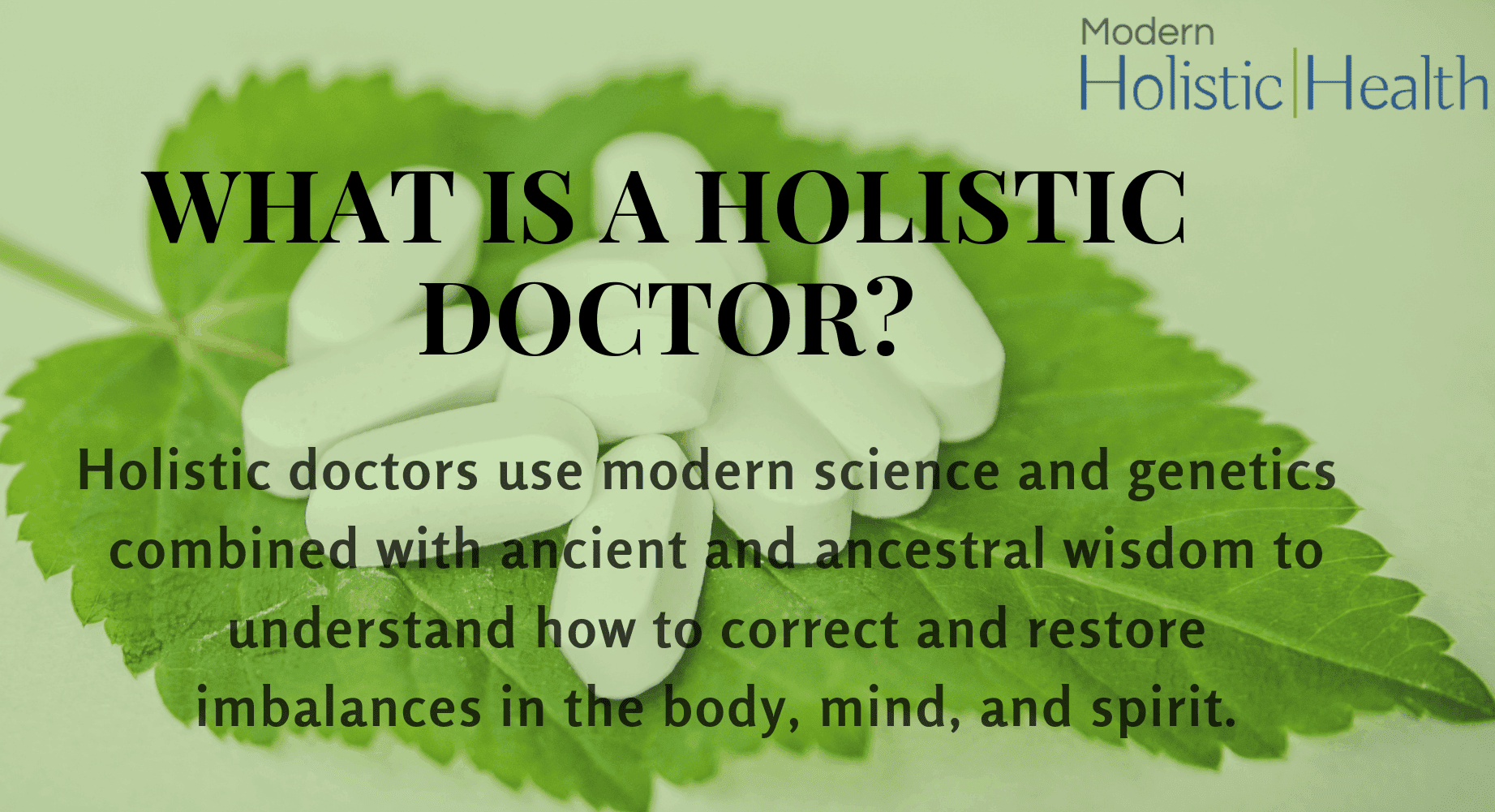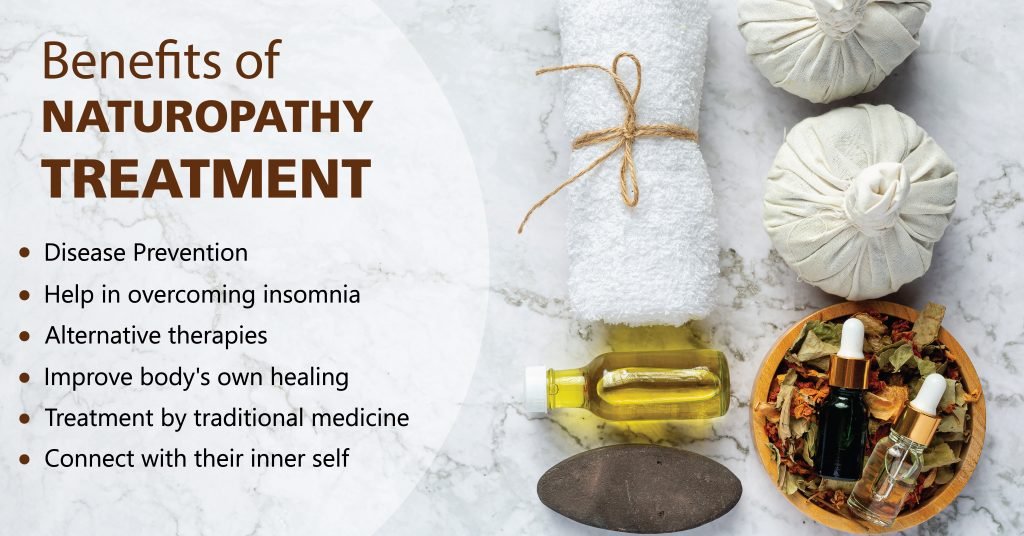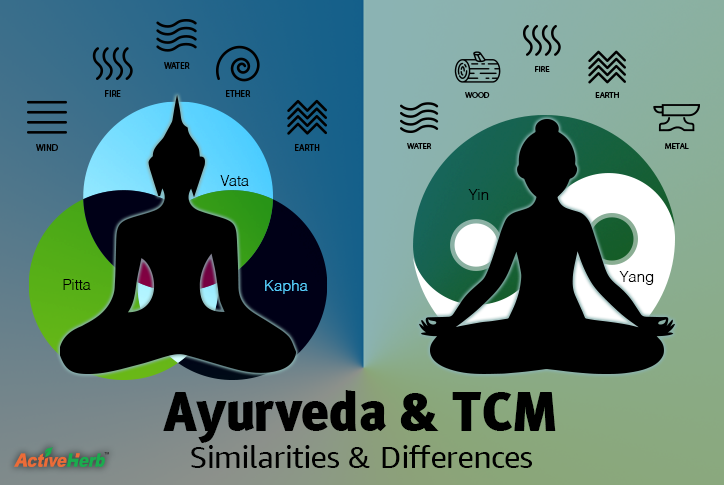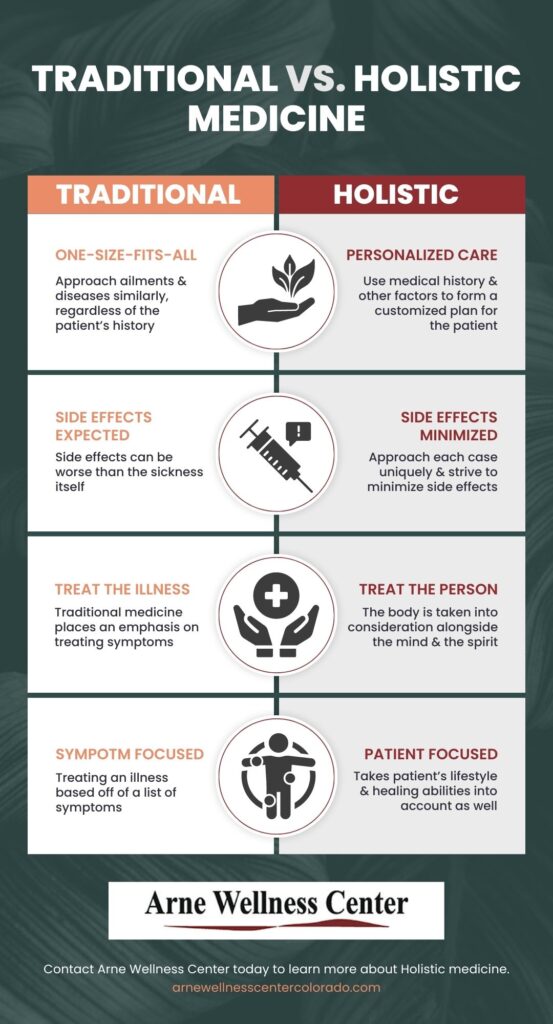Naturopathy is a system of treatment of disease that avoids drugs and surgery and emphasizes the use of natural agents (air, water, herbs, etc…) and physical means (tissue manipulation, electrotherapy, etc…). Holism is a theory that the universe and especially living nature, is correctly seen in terms of interacting wholes that are more than the mere sum of elementary particles. Holistic approaches within medicine encompass every aspect of a person and their life including the physical, mental, emotional, spiritual, etc… parts of life.



Naturopathy and its equivalents have roots all over the world and have been used in every culture in one form or another forever. While the term was coined in the 1800s the use of natural remedies for illnesses has always been around. The practice was “brought” to the United States in the 1800s and has since changed and shifted based off the needs of its users and their cultures. By the mid 1900s naturopathic medicine was phased out in favor of the more “conventional and modern” approaches to healing. Now naturopathy has begun to make a comeback and some folks within the U.S. have begun to rediscover and spread the uses of naturopathic medicine. Naturopathic treatment plans tend to focus on prevention, strengthening the body’s natural immunities, and taking personal responsibilities to optimize one’s own health.

Holistic practices focus on the idea that healing is more effective when one considers the entire patient, rather than just focusing on the patient’s illness. Holistic health requires balance within one’s life in order to treat illnesses. The most well known types of holistic medicine are Traditional Chinese Medicine (TMC) and Ayurveda. Ayurveda is an ancient medical tradition founded in India which incorporates the beliefs of the five great elements of the universe, the seven primary elements of the body, and the three “doshas” (biological energies). TMC originated almost 5,000 years ago and is still practiced today. TMC views the body as its own small universe that is full of interconnected systems that include physical elements and intangible energies. Both TMC and Ayurveda utilize herbal medicine which has also been utilized by Indigenous populations all over the globe for centuries.

Both holistic and naturopathic medical approaches encourage or require their users to find balance between all aspects of their lives in order to strengthen their immune systems, address illnesses, and treat a whole host of issues within their bodies.

As we have read throughout the semester, mental health plays an important role in addiction. Many people begin trying to get away from pain, to cope with the unbearable, and so much more. Once folks reach the levels associated with addiction they have to live with the stigma of addiction and the way they are viewed as outcasts by much of society. Holistic and naturopathic approaches prioritize mental and spiritual health as something just as important as physical health. Folks who are struggling with addiction may find the practices available through holistic practices helpful when dealing with the demons that pushed them towards drugs. Focusing on the mind-body-spirit connections within ourselves we are better able to recognize the traumas, pain, and other things that we were trying to run away from. And using these holistic approaches we can begin to heal different parts of us that need the drugs to cope.

The debate between naturopathic medicine and pharmaceutical medicine has been around since modern medicine was introduced. Why boil willow bark when you can just pop a pill from Walgreens? However for the past several decades doctors have been battering us with importance of exercise, balanced diets, and so on. These are key elements within natural medicine, we’re just used to hearing about them from a different perspective. Melatonin is sold in almost every grocery store in order to help those with sleeping problems and the chemicals that stimulate the release of melatonin in your brain can be found in a variety of foods you can eat before you go to bed. Chamomile tea is proven to help calm nerves, ginger is great for helping with upset stomachs, St. John’s Wort has been studied for a while now as being an effective supplement for mild depression and anxiety medication. When you compare the effectiveness of naturopathic medicine with modern alternatives there are mixed results. I believe that using a mixed approach can be the best way to incorporate the best of both worlds. There is almost always room for improvement and in some areas modern medicine is the way to go, but not always. Using natural remedies in tandem with some medications can be useful so long as you are incredibly aware of how each piece works as some herbs can counteract active ingredients in 21st medication and vice versa. Knowing how your body reacts to certain things is incredibly important. Another of the key components within successful natural medicine and holistic approaches is being in touch with your own body and learning to understand what it is telling you in order to properly treat yourself and allow others to treat you.

While holistic and naturopathic approaches have been around forever, the emergence of modern medicine introduced the barrier of stigma and accessibility to natural and holistic medicine. Many forms of insurance will not cover naturopathic practices and folks who don’t understand or don’t agree with natural medicine may introduce the barrier of shame when people they know look into these alternative forms of treatment. As social workers it is important to advocate for any client to be able to access the best type of care for them. When working with addiction it is incredibly important to make sure that these folks are not harmed even more by society’s lack of acceptance or ignorance when it comes to deviance from the status quo. It’s important for social workers to advocate for what works best for each individual client as well, so for those who come from cultures outside of our stereotypical white western approach, looking into natural medicine may be an important piece of the treatment required for these folks. It’s important to work with everyone exactly where they are and involve pieces of their heritage or beliefs that are important to them.

It’s important to use evidence-based practices in all aspects of social work. However, not all evidence shows up in neatly written research papers published by Harvard. More research needs to be done on the applications of naturopathic remedies in the modern world, but while that is happening social workers can look back at hundreds of years worth of evidence written down by the Egyptians, Indigenous peoples spanning different continents, cultures that passed down information for generations, and more. Using our modern methods of fact checking we can do our own research when it comes to the correlations between what folks used in the “old days” and what doctors are doing now. Social workers are also not required to use one or the other. One of the cool things about a holistic approach is that it can utilize the parts of modern medicine that work for specific individuals and supplement natural remedies for the things that don’t work. We can encourage clients to take the driver’s seat when it comes to outlining the things that are important to them in terms of their overall health and how they would like to reach those goals. I don’t think there is a “one size fits all” approach that we can apply to addiction. I think it is important to acknowledge every piece of the people we encounter and work together to help them become the best versions of themselves that they choose to be while utilizing all of the tools at our disposal.



Comments
2 responses to “Blending the Past and the Present”
Hi Jasmyne,
Thanks for the informative blog. I really wasn’t familiar naturopathy prior to reading this. I think the aspect of how social workers can interact with naturopathy is super interesting given the fact, that a lot of people they work with have health conditions as a result of their adversities. For example poverty and trauma. In doing a little more research about the topic, I think there are benefits to be had from naturopathic approaches. The journal I found pointed out that naturopathic medicine is inherently social and I think this is super important given that when you have a chronic condition, mental illness, or struggle with substance abuse, you experience more isolation and this creates worse health outcomes.
Yea for sure!
I think you make an interesting point. I hadn’t necessarily thought about the socialization aspect but you’re totally right. I think being able to create communities of care would definitely improve health for a lot of folks and as social workers it’s kind of our job to help our clients build those communities so they can be better supported and able to support others through a variety of ways that may not always be the stereotypical route. Connections are super important to our overall health and our communities.